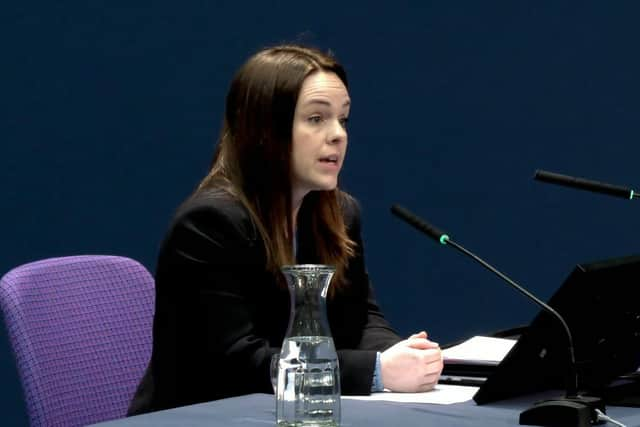UK Covid Inquiry: Kate Forbes chooses her targets carefully as she paints picture of two-tier Scottish Government
While many inside and outside the SNP expected this would be the day Kate Forbes had her reckoning, the former finance secretary chose her targets very carefully.
There was no stern criticism of the Scottish Government’s handling of the pandemic during the session, and she stopped short of direct broadsides against the-then first minister Nicola Sturgeon or individual members of her Cabinet.
Advertisement
Hide AdAdvertisement
Hide AdTime and again, Ms Forbes also empathised with the priority given by the government to tackling the health harms of Covid, reasoning that unless that was mitigated, the economy would be in peril. And she conceded that while better directed investment could have mitigated other harms – noting that a lack of long-term planning led to a “patchwork” response in the education sector, for example – there was only so much that could be done.
“We weren’t sitting with considerable sums of money and the time and capacity to build systems,” she pointed out.
None of which is to say that Ms Forbes did not pursue a reckoning of sorts. She may not have condemned the decisions taken by the government she served in, but she went some considerable way to denounce the manner in which they were taken, painting a picture of an administration that was governed using concentric circles.
While some Cabinet secretaries occupied the centre, close to Ms Sturgeon, others, like Ms Forbes, were kept on the outside. Or that, at least, was the perception.
The most startling moment of the evidence session at the Edinburgh International Conference Centre came when Ms Forbes was questioned directly by the inquiry chair, Baroness Heather Hallett, who seemed visibly bemused at why she was not in attendance at many of the Gold Command gatherings, which primarily involved Ms Sturgeon, a small group of advisers, and a revolving group of ministers.


Asked directly why she was not present at the initial tranche of meetings during 2020, Ms Forbes replied bluntly: “I wasn’t invited. I’m not even sure I was aware that they existed, because I was invited to my first one not really knowing what it was until someone explained it.”
Questioned by Baroness Hallett on whether she would have expected to be invited, another brutally curt blow was delivered. “I would have expected to be invited to any meeting where there were significant financial implications,” Ms Forbes replied.
Indeed, the mystery of the Gold Command meetings and what transpired during them was a key part of Ms Forbes’s evidence. The inquiry has previously heard that although meetings of the Cabinet were minuted, gatherings of the Gold Command group were not, meaning the inquiry has been unable to obtain any documentation relating to key decisions that were taken.
Advertisement
Hide AdAdvertisement
Hide AdQuestioned about those meetings by inquiry lawyer, Jamie Dawson KC, Ms Forbes said there was a digital trail of what was discussed, recalling summary emails that were sent out afterwards that addressed “the main issues that were discussed”. The question of who drafted those emails, and why they are not available to inquiry, will no doubt be a topic that is revisited.
Other evidence given by Mr Forbes pressed on the issue of record management, and further exposed the inconsistencies around the government’s policies around the retention of WhatsApp messages. Ms Forbes made it clear she was not aware of guidance introduced in November 2021 that advised the regular deletion of all messages once any significant information had been recorded centrally.
Given the SNP MSP for Skye, Lochaber and Badenoch told reporters in November that she had retained all of her Covid WhatsApp messages, this was not necessarily a surprise, and she told the inquiry she had shared all her communications “in the spirit of being completely open". But hearing her describe how her understanding of the guidance was so markedly different to other members of the government of the time was illuminating, and raised further questions about the government’s information management.
Ms Forbes told the inquiry that she didn't delete any of her WhatsApp communications with other Cabinet members or special advisors until January 2022, a period "after all the major Covid decisions were taken”. She said that on or around that month, a junior member in her private office notified her that a government policy required the deletion of WhatsApp messages with the office. Crucially, however, she said it was her understanding the policy was not relevant to communications with her fellow ministers or others in government.
Elsewhere, perhaps the most interesting aspect of the two-and-a-half hours Ms Forbes spent before the inquiry was her reflections on substantive issues regarding devolved finance. She was open and illuminating in discussing her frustrations over how the way the Barnett formula hindered the “flexibility” of funding required, and was unable “bear the weight” of the emergency at hand.
Although she characterised her relationship with those in the UK government as broadly constructive, she said Treasury officials responsible for dealing with devolved nations were often not in the loop about funding decisions, and were unaware of imminent announcements. At one point, she said, there was a "breakdown" in communications amongst Treasury staff.
For an inquiry that is trying to get the bottom of the intergovernmental relations between the administrations at Edinburgh and Westminster, such insights will be invaluable. And for the political tribes at Holyrood, some of the explosive revelations offered up Ms Forbes will offer ample talking points for First Minister’s Questions and beyond.
Comments
Want to join the conversation? Please or to comment on this article.